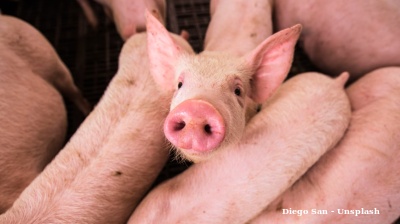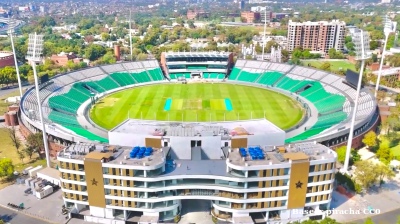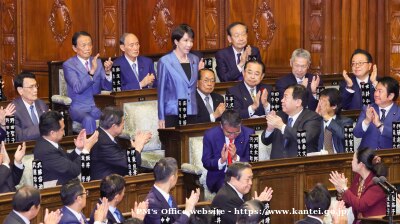Georgia’s outgoing President Salome Zourabichvili told supporters on December 29 that she will leave the presidential building but continue her work, describing herself as the “only legitimate institution” left in Georgia.
Zourabichvili gave an address to supporters gathered outside the Orbeliani Palace in Tbilisi on December 29, while the inauguration of her appointed successor, Mikheil Kavelashvili, took place in the nearby parliament.
Zourabichvili argues that the newly elected parliament is illegitimate, and is therefore unable to appoint her successor; under new rules Georgia’s president is elected by an Electoral College comprising MPs and other officials.
The standoff follows weeks of protests initially sparked by the October general election, that Zourabichvili and Georgia’s pro-Western opposition say was rigged in favour of the ruling Georgian Dream party.
The ruling party then picked Kavelashvili, a former Manchester City footballer and ally of Georgian Dream founder Bidzina Ivanishvili, as Zourabichvili’s successor.
Zourabichvili had previously said she would remain in Orbeliani Palace, the presidential residency, until a legitimate successor was elected, sparking a constitutional crisis.
“Let’s remember what legitimacy is, it comes from only one source, and that source is you, the people. Where there is no trust of the people, there can be no legitimacy and that is why I will come out and be with you,” Zourabichvili told supporters, according to reports in the Georgian media.
She continued: I’m going to come out of here and come to you and be with you. This building doesn’t belong to anyone, this building was a symbol while the president, who was legitimate, sat here. I’m taking away the legitimacy, I’m taking away the flag, I’m taking away what is your trust.”
Outlining her plans after leaving the presidential palace, Zourabichvili said she plans a series of regional tours to meet with protesters, civil society, businesspeople and other groups, as well as travelling abroad to Western countries.
Daily protests have taken place in Tbilisi and other towns and cities since Prime Minister Irakli Kobakhidze’s November announcement that Georgia would put its EU bid on hold.
Riot police have taken a heavy-handed approach to the protests, using tear gas and water cannons, while protestors have retaliated with fireworks and stones. Hundreds of people including prominent opposition leaders have been arrested.
Ahead of the inauguration on December 28, protesters formed a symbolic "Chain of Unity" across Tbilisi and major cities like Batumi and Kutaisi, braving cold and rainy weather. Zourabichvili joined the demonstrators, holding hands with citizens.
Western governments have criticised Georgian Dream’s actions. On December 28, the United States imposed sanctions on Ivanishvili, accusing him of undermining Georgia’s democratic institutions and aligning the country closer to Russian influence.
"Georgia’s Euro-Atlantic future has been derailed," US Secretary of State Antony Blinken said, citing "ongoing and violent repression" of citizens, journalists, and opposition figures.
US Representative Joe Wilson voiced support for Zourabichvili, saying on December 28: “America stands with the only legitimate Georgian leader Salome Zourabichvili and the Georgian people as they demand free and fair elections.”
Lithuanian President Gitanas Nausėda echoed these concerns in a call with Zourabichvili, warning that Georgia risks becoming another Belarus. "This suspension of EU accession talks undermines Georgia’s will and plays into Russia’s hands," Nausėda said.
The European Parliament has previously condemned the election as part of a "worsening democratic crisis”, while the UK sanctioned five senior Georgian officials, including the interior minister, for their roles in suppressing protests. Kobakhidze has also been barred from entering Lithuania, having been added to the Baltic States’ sanctions list.
News

MOL says no risk to domestic fuel supply after Danube refinery blaze
Fires broke out at refineries in both Hungary and Romania in recent days.

Taiwan confirms first African swine fever outbreak
Authorities detected the virus on a pig farm in Wuqi District, Taichung, after 117 pigs died between October 10 and 20.

Afghanistan withdraws from Pakistan tri-nation T20 to protest murder of three local cricketers
The Afghanistan Cricket Board says it has secured clear video footage implicating the Pakistan state in an attack that killed three local cricketers.

Sanae Takaichi makes history as Japan’s first female prime minister
In her first press briefing as leader, the 64-year-old pledged to drive reform with confidence and determination, describing her administration as one “ready to decide and move forward.”




